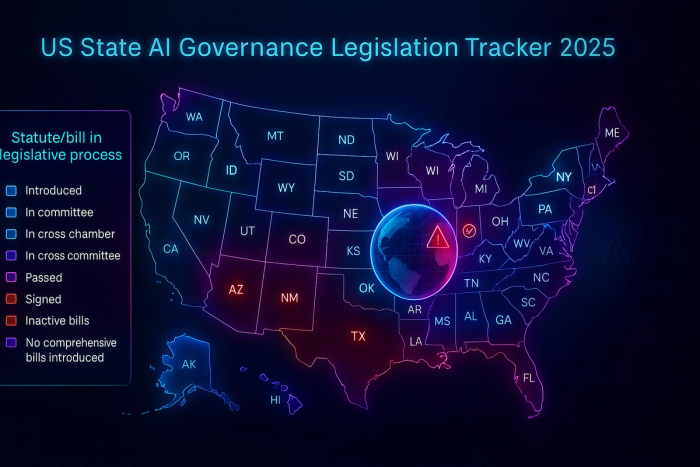States Accelerate Healthcare AI Rules, Creating a Patchwork for Pharma and Providers
Oct 08, 2025 | 3 min read

New state bills and laws set disclosure, bias testing, and human-oversight expectations for AI (artificial intelligence) in health care.
Summary
States are moving fast on healthcare AI, with a surge of bills that set rules for disclosure, human-in-the-loop decisions, and record-keeping. In 2025, all 50 states, Washington, D.C., Puerto Rico, and the U.S. Virgin Islands introduced AI legislation, and 38 states adopted or enacted around 100 measures affecting sectors including health care. See the National Conference of State Legislatures’ live tracker for the latest counts and text. NCSL tracker. (NCSL)
What happened
- The NCSL (National Conference of State Legislatures) reports universal state introduction of AI bills in 2025, with dozens of enactments that touch healthcare use cases such as clinical decision support, payer algorithms, and disclosures to patients. NCSL summary. (NCSL)
- Separate legal trackers highlight a wave of health-specific requirements—for example, proposals that mandate patient disclosure, bias testing, and a human decision-maker for clinical or coverage decisions. Manatt Health tracker. (Manatt Phelps & Phillips, LLP)
- Recent bills in states like Pennsylvania show where policy is heading: draft language would require transparency when insurers, hospitals, or clinicians use AI and ensure a human makes the final individualized decision. PA co-sponsorship memo • Healthcare Finance News. (Pennsylvania General Assembly)
Key numbers and dates
- 50 states + D.C., PR, USVI: Introduced AI legislation in 2025. NCSL summary. (NCSL)
- 38 states: Adopted or enacted ~100 AI measures so far in 2025. NCSL summary. (NCSL)
 The map identifies the AI legislation process across all 50 states as of July 2025
The map identifies the AI legislation process across all 50 states as of July 2025 What to watch next
- Health-specific enactments: New state laws that explicitly govern clinical decision support, utilization review, patient disclosures, and algorithmic bias testing. Manatt Health tracker. (Manatt Phelps & Phillips, LLP)
- Operational guidance: Agency bulletins or model policies that clarify documentation, audits, and appeals when AI informs coverage or care decisions. NCSL database. (NCSL)
Why this matters for you
Marketing, medical, and payer-strategy teams should assume state-by-state variance in what must be disclosed when AI influences coverage criteria, patient education, or care navigation. Build plain-English templates that explain where AI is used, who oversees it, and how patients can request a human review. Align copy, videos, and chat flows with these disclosure rules so content can be deployed nationally with state add-ons rather than one-offs.
Digital, data, and legal teams will need governance playbooks that travel across states: model purpose statements, data lineage, bias testing plans, human-in-the-loop checkpoints, and audit trails for decisions. Standardize these artifacts now so they slot into state compliance packets, provider contracts, and payer negotiations—reducing rework as the map changes.
Source: NCSL — 2025 AI legislation summary; NCSL — AI legislation database; Manatt Health — Health AI Policy Tracker; Pennsylvania co-sponsorship memo; Healthcare Finance News. (NCSL)



 Gradial
Gradial  PEGA
PEGA 




